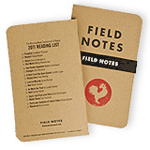by Aimee Bender
Doubleday
Buy at Powell’s »March 28, 2011
Jonathan Franzen
Jennifer Egan
Judged by
The charm of both of these dynamic books lies in the unlikeability of most of the main characters. Let’s start with Freedom.
Patty and Walter Berglund make up a fiercely left-leaning intellectual couple living in a gentrifying St. Paul, Minn., neighborhood. Their socially conscious, commendable conduct is instantly suspicious. They deal with questions like, “Were the Boy Scouts OK politically? Was bulgur really necessary? Where to recycle batteries? How to respond when a poor person of color accused you of destroying their neighborhood? How elaborate did a kitchen water filter actually need to be? Did your 240 sometimes not go into overdrive when you pushed the overdrive button? Was it better to offer panhandlers food, or nothing?”
 Buy anything from Field Notes from now until the end of the ToB and receive a special “reading list” memo book free, while they last. Use coupon code ROOSTER.
Buy anything from Field Notes from now until the end of the ToB and receive a special “reading list” memo book free, while they last. Use coupon code ROOSTER.Franzen does such a good job capturing their self-righteous liberal lifestyle without any cartoonishness that it’s a little unsettling for a self-righteous liberal reader. The Berglunds’ son Joey, in a fit of rebellion, moves in with Connie, the frumpy girl from next door, her mother Carol “the only non-gentrifier left on the block,” and Carol’s beer-guzzling boyfriend Blake, who erects some hideous vinyl-sided eyesore addition to their house, essentially negating the Berglund’s 10-year project of beautifying the block. Joey is an inconsiderate slob who heads off to college, smokes a lot of pot, toys with a couple of girls, and ends up (in actually what I found to be one of the rare totally unbelievable plots) a major player in some sort of international arms-trading company at something like the age of like 21. Another major player is Walter’s oldest friend, Richard Katz, a self-involved rocker who’s only comfortable making everyone else uncomfortable.
A Visit From the Goon Squad opens with Sasha, a neurotic kleptomaniac who works as a record company assistant, on her therapist’s couch, recounting a recent date and embarrassing thieving episode. It seems Sasha has gotten pretty bored of her albeit boring-sounding life, and stealing is the way to get her kicks. Sasha works for Bennie Salazar, a former-punk-rocker-turned-record-exec who sprinkles actual gold flakes into his coffee in the hopes of combating his erectile dysfunction, and, if not reading too far into it, in the hopes of regaining some sort of emotional connection to the music he once enjoyed, and thus on to the world around him. Bennie is divorced and struggling to maintain a connection with his son—he’s definitely on his way down when we meet him, as is illustrated by a trip out to a suburban basement to witness an over-the-hill teen girl group’s failure of an audition. Each chapter focuses on a new character, and so by the book’s end we have been introduced to a large supporting cast, all of whom have some connection to Sasha or Bennie (or both).
Both books are chopped up unusually, and do a lot of jumping around. Freedom opens with a neighborhood appraisal of the Berglund family, jumps into Patty’s journal, back into a third person account of things, back into Patty’s journal, and finally back to a third-person conclusion. Goon Squad introduces a new character every chapter, switches to the second person at one point, includes a 75-page PowerPoint presentation, jumps across continents and time, and ends up some time in the near-ish future.
I found myself more attached to the characters in Freedom, as Franzen spends 550-odd pages developing nine to 10 personalities. I also thought his acute sense of people was remarkable. The sheer number of characters in Goon Squad left me a little overwhelmed (especially since I have trouble remembering names), and sometimes the plot roamed a little too far, as when a struggling publicist escorts a rebounding movie star to the secret headquarters of a dictator.
That said, congratulations to both writers.
Hamilton Leithauser is the lead singer of the band The Walkmen. Known connections to this year’s contenders: “None.”